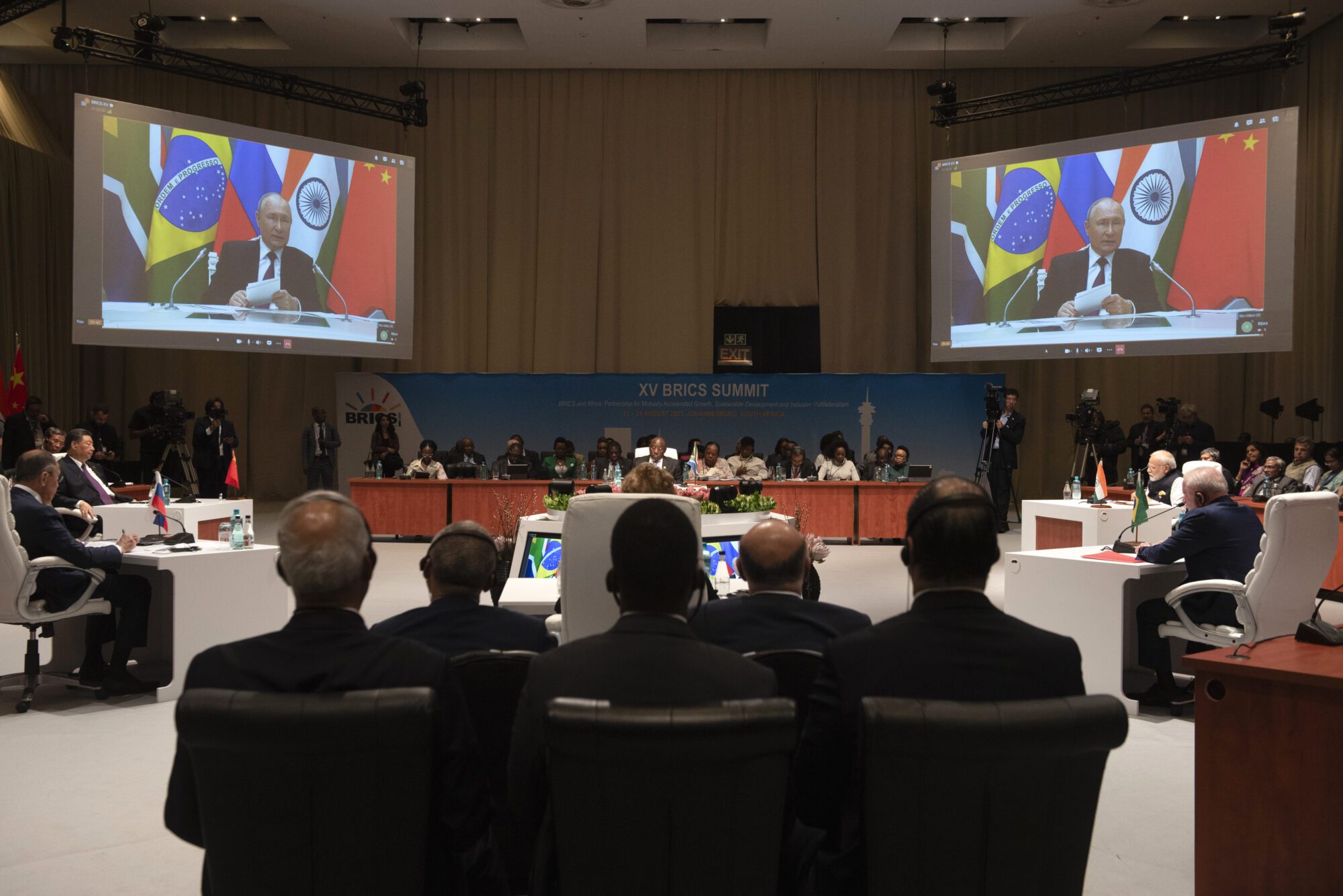
The 15th annual BRICS Summit kicked off on Tuesday evening in Johannesburg, followed by a public session on Wednesday, as the leaders representing nearly half of the world’s population discussed economic partnerships, sustainable development, and finding third-world-friendly alternatives to the Western-dominated global financial system.
Yet it wasn’t economics but the war in Ukraine that took the spotlight, as Putin—the only leader not physically present—used his screentime to rally the “global majority” to his cause and attempt to justify the Russian aggression against Ukraine.
According to Putin—who addressed the summit through video link due to a “mutual agreement” that absolves South Africa from having to carry out the International Criminal Court’s arrest warrant against him—Russia did not instigate the hostilities, but is merely trying to put an end to the war “unleashed by the West” following the “unconstitutional coup d’état” of 2014.
“The desire of a number of Western countries to maintain their hegemony in the world led to a severe crisis in Ukraine,” President Putin said during Wednesday’s public session. “Russia decided to support people who fight for their culture, traditions, language, and future,” he went on, adding that:
The actions of the Russian Federation in Ukraine are dictated only by the desire to stop the war of extermination unleashed by the West.
With regards to an eventual settlement, Putin reiterated what he has claimed repeatedly before: that Moscow is ready to enter peace talks, but only if they acknowledge the “new realities” on the battlefield—meaning the annexed and integrated territories in Southeast Ukraine. Kyiv, on the other hand, is only open to dialogue that begins with the restoration of the entire country.
As we wrote in our pre-summit explainer, two visions compete within the BRICS today regarding the group’s future role in global geopolitical dynamics. India (along with Brazil and this year’s host, South Africa) would rather see it as the block of non-aligned developing countries and regional powers whose goal is all about economic growth and sustainability while creating a more inclusive financial system in friendly dialogue with G7 countries.
China (and obviously, Russia), however, sees the BRICS as a vehicle for challenging the West’s economic, political, and ideological hegemony, as if the group was merely an extension of Beijing in the Sino-American power struggle. And since China is by far the strongest of the five and is indirectly supporting Russia in its Ukrainian venture, the three democratic states had no option but to allow Putin to use the summit as a platform to ideologize in defense of his war.
During his opening remarks on Tuesday, Putin began by trying to appeal to the developing world, presenting himself as a savior and offering free grain to selected countries to replace the lost shipments due to the collapse of the Black Sea Grain Deal—and the Russian bombardment of the port of Odesa. Of course, he said, the Western actions are to be blamed for the food shortage in Africa, but Russia is there to help as much as the sanctions allow it.
“Russia is being deliberately obstructed in the supply of grain and fertilizers abroad, and at the same time we are hypocritically blamed for the current crisis in the world market,” Putin said, but adding that:
Our country has the capacity to replace Ukrainian grain both commercially and as free aid to needy countries, especially as our harvest is expected to be perfect this year.
The other participants of the Summit were wise not to take any sides on the issue and seemingly avoided talking about Ukraine whenever it was possible. Nonetheless, the host, SA President Cyril Ramaphosa called for resuming the Grain Deal, and noted that BRICS fully supports every effort to bring the conflict to an end.
So far, the leaders have not lingered too long on the main point of the Summit’s agenda, the prospective enlargement to up to 28 (or more) members in the near future. As we have previously written, rushing the expansion would mainly benefit China, while India and Brazil are cautious not to tip the internal balance too far towards Beijing.
Regardless, both countries expressed support for moving forward with the enlargement on Wednesday, albeit only if a true consensus is reached. It’s still unclear which applicants will get the green light this year (if any), but Argentina, Egypt, Saudi Arabia, and Indonesia are the likeliest contenders, while Iran remains the biggest question mark.
“We want BRICS to be a multilateral institution, not an exclusive club,” Brazil’s President Lula said, but added that every new member will have to meet certain criteria so that the group does not become a “Tower of Babel.”
More information is expected to be announced on the BRICS expansion during the Summit’s last day on Thursday.
